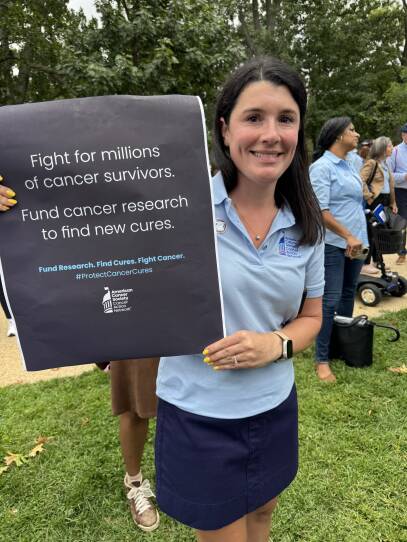A dozen Massachusetts volunteers, cancer survivors and caregivers traveled to Washington, D.C., to directly lobby lawmakers on Tuesday to preserve federal medical research funding.
The advocates were part of the American Cancer Society Action Network’s annual lobby day, which drew over 700 people to Capitol Hill ahead of a September 30 deadline to pass a new federal budget, and press for a reversal of cuts already made.
They say future cures, diagnostics and treatment are at risk due to proposed reductions in research funding to the National Institutes of Health (NIH), National Cancer Institute (NCI) and the Centers for Disease Control and Prevention.
The Trump administration has recommended cutting $18 billion in NIH funding, which would reduce spending at the agency at levels not seen since 2003. Several Congressional committees recently rejected cuts to NIH and NCI, but advocates are concerned that the funds are still on the chopping block.
“I’m alive because of cancer research funding,” said Kate Weissman, a Natick resident and cancer survivor visiting Washington who spoke to GBH News. “The research happens in our backyard. It happens in Cambridge. We have the access to the brightest minds in this world, but if they do not have the funding, they cannot do their jobs and they cannot find cures.”
Weissman was diagnosed with stage 2 cervical cancer in 2015 at the age of 30. She went through 55 rounds of radiation, 17 rounds of chemotherapy, and surgery, along with IVF treatment, as many cancer treatments impact fertility. Her health insurance covered much of the care, but in the end, her parents had to use $95,000 from their retirement to help pay for the rest. She is now in remission.
“Not only was cancer causing emotional strain on my family, it was beginning to cause financial strain on my family, even though I had health insurance. So I came out of the disease with so much more knowledge and understanding and empathy for what this disease does to families,” she said of her decision to advocate for cancer research funding, treatment affordability, and coverage.
Weissman said NIH and NCI are “under attack” but as she’s also heard as recently as yesterday of other programs being cut, such as pediatric oncology.
“The cuts, they are very wide reaching at this point, unfortunately,” she said.

Advocates are asking for the highest possible funding increases for cancer research, including $51.3 billion for the NIH, and $7.9 billion for NCI. They also want to see $1.5 billion for the Advanced Research Projects Agency for Health, and $702 million for the CDC and National Breast and Cervical Cancer Early Detection program.
In May, the Trump administration proposed a 37% cut to NIH funding for fiscal year 2026 and announced it was eliminating the Division of Cancer Prevention and Control at the CDC.
Dana Bernson of Newton is an epidemiologist who lost her first husband to cancer.
Bernson said she wanted to turn “the worst thing that ever happened in her life into something positive,” and has spent a decade volunteering for both the American Cancer Society and the American Cancer Society Cancer Action Network.
Along with fighting against cuts and pushing for increases to cancer research funding, she said the group is also pushing for the Medicare Multi-Cancer Early Detection and Screening Act. The bill would authorize Medicare to cover multi-cancer early detection screening tests as soon as they are approved by the FDA.
Bernson said it’s one of the “most highly co-sponsored bills” in Congress with two-thirds of congress co-sponsoring.
She said the group had visited the offices of Senators Elizabeth Warren and Ed Markey, and U.S. Rep. Jake Auchincloss, and found support for their efforts.
Along with the life-changing impact cancer has on patients, advocates say that the cuts are already causing the closure of labs in Massachusetts and layoffs of researchers.
Bernson said funding cuts would be devastating to Massachusetts.
“We receive a higher proportion of NIH dollars than any other state. And so when funding is cut, it’s not only impacting our ability to find future cures and to find the next therapies, but it’s actually impacting jobs and direct economic loss here,” said Bernson.
The advocates spoke with members of Congress to discuss supporting federal funding for cancer research and prevention ahead of the September 30 deadline to pass a new federal budget, and after cuts have already been made to previous programs.
Weissman, Bernson, and others asked lawmakers to continue to push for a spending bill for FY 2026 that includes the highest possible increases for cancer research and prevention. There is a September 30 deadline to pass the new federal budget.
According to the American Cancer Society, some 44,000 patients in Massachusetts have received new cancer diagnoses this year. Cancer is expected to claim the lives of some 12,000 Massachusetts residents this year.
The group says that in the last 30 years substantial and steady increases in federal cancer research funding have fueled discovery and innovation that has led to a 34% decline in cancer mortality rates.





